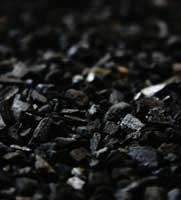Disruptive technologies in tyre manufacturing now focus on reducing environmental impact through materials with recycled content, says Angelica Buan in this report.
Putting the brakes on waste rubber pollution
End-of-life tyres (ELTs) pose a significant environmental challenge by contributing to pollution akin to microplastics as rubber fragments enter the environment. The threat is clear, shown by recent studies revealing how much harm waste rubber can cause.
Recently, researchers from the University of Vienna in Austria and The Hebrew University of Jerusalem in Israel discovered traces of tyre additives in leafy vegetables. These chemicals, used to deter tyre ageing and corrosion, were found in vegetables from Swiss supermarkets and Israeli farms, highlighting the pervasive nature of tyre rubber particles in the environment.
 Published in Frontiers in Environmental Science, the study tested leafy vegetables from Switzerland, Spain, and Italy, along with crops directly harvested from Israeli fields. Researchers identified tyre ingredients in 11 of 15 supermarket samples from Switzerland and nine of 13 samples from Israel. Notably, the additive 6PPD, used to prevent tyre cracking but known to be harmful to wildlife like coho salmon, was among the chemicals detected.
Published in Frontiers in Environmental Science, the study tested leafy vegetables from Switzerland, Spain, and Italy, along with crops directly harvested from Israeli fields. Researchers identified tyre ingredients in 11 of 15 supermarket samples from Switzerland and nine of 13 samples from Israel. Notably, the additive 6PPD, used to prevent tyre cracking but known to be harmful to wildlife like coho salmon, was among the chemicals detected.
Scientists suspect these tyre additives enter the food chain through various pathways, including irrigation with treated wastewater and the use of sewage sludge as fertiliser. Airborne particles settling on soil may also contribute to contamination, albeit, at relatively low concentrations. Despite these findings, the study emphasises the potential risk of consuming additives present in food.
Amidst efforts to manage and reduce waste, tyre producers are increasingly focused on sustainable solutions, including reclaiming rubber from discarded tyres. By converting old tyres into valuable resources, the industry not only reduces its environmental impact but also sets new benchmarks for efficiency and waste reduction.
The global sustainable tyre materials market is projected to exceed US$530 million by 2032, growing at a CAGR of 32.88% from 2023 to 2032, according to Bis Research. This rapid growth is driven by increasing demand for ecofriendly tyres and the adoption of sustainable materials in both passenger and commercial vehicle manufacturing. Despite challenges such as stringent regulations and environmental concerns, tyre manufacturers are leveraging advanced technology to turn these obstacles into opportunities.
Partnerships extend life cycle of materials
Finnish oil refining firm Neste, Austrian-headquartered polyolefin solutions provider Borealis, and German materials maker Covestro have teamed up to upend the use of discarded automotive materials.
By recycling old tyres into high-quality plastics, the partners aim to enhance sustainability and resource efficiency. The process begins with Neste liquefying old tyres through chemical recycling. Borealis then processes these liquefied materials into base chemicals such as phenol and acetone, which are supplied to Covestro.Covestro utilises these chemicals to manufacture high-purity polycarbonates for various automotive applications, ranging from headlamps to radiator grilles.
The partners’ stress the importance of collaboration in achieving circularity and supports sustainable polymer applications and the recycling of low-quality waste into high-quality plastics, benefiting both industries and the environment.
The first products resulting from this cooperation are already available, showcasing the successful integration of recycled content into high-performance automotive materials. With the potential for scalability, this project is anticipated to influence future EU regulations, such as the End of Life Vehicles Regulation.
